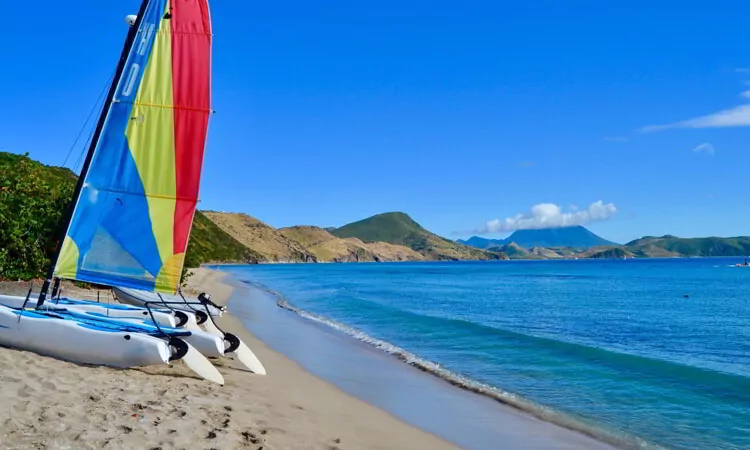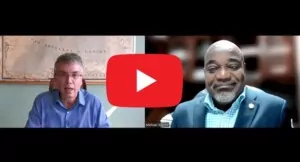
St. Kitts And Nevis Citizenship By Investment: Your Best Plan B
VIDEO: Save $25,000 Today
I’ve said it before, and I’ll say it again: A second passport is perhaps the number-one way to boost your “Plan B” options.
With a second citizenship, you have the eternal right to live and work in a place other than your home country.
In other words, you have a place to escape to during the next lockdown or the next “Black Swan” event.
Normally, you will have to spend significant amounts of time in a foreign country, or have an ancestor from there, to be eligible for citizenship and a passport.
But… if you have the money, you can simply invest in certain countries, and be eligible for their passport.
Right now, the world’s premier citizenship-by-investment program, in the Caribbean twin-island nation of St. Kitt’s and Nevis, comes with a US$25,000 discount.
With your investment, you get citizenship in a gorgeous Caribbean nation, and a well-regarded second passport, with visa-free or visa-on-arrival entry to nearly 160 countries…
For the donation-investment option of their CIP, the minimum requirement is US$125,000 for a single applicant, US$150,000 for a main applicant and spouse, and US$175,000 for a family of four, payable to the Sustainable Growth Fund.
These reduced rates are only available through June 30…
From July, the rates are set to go back to what they were in 2022—i.e. US$150,000 for the main applicant, US$175,000 if a spouse is included, and US$195,000 for a family of four.
If you’re interested in the St. Kitts & Nevis program—don’t delay. You’ll want to get in while those reduced rates (up to US$25,000 off!) are still available…
Recently, I sat down with Michael Martin, St. Kitts and Nevis’ Citizenship-by-Investment Program Director.
We talked about the special program discount that’s only available for a limited time… the history of the CIP and what the future holds… and the real benefits of holding a St. Kitts and Nevis passport…

Here’s an edited transcript covering all of the big things we discussed… Enjoy!
LIEF SIMON: Tell me a little bit about the history of the program and what it does for the islands…
MICHAEL MARTIN: Our program started nearly 40 years ago in 1984. It was started as an initiative for attracting foreign direct investment. And over the years it has allowed our nation to thrive. It has given us the opportunity to advance our people without overreliance on international financial aid.
The vision to use economic citizenship to attract international investment was innovative in 1984. But nowadays, as you know, there are many, many countries offering economic citizenship. And so our first major evolution was 27 years ago… We made some changes again last year which will ensure that the program continues to remain stable, that it’s a program that is well respected around the world and that it maintains the integrity that people have become accustomed to in our program.
LIEF SIMON: And I think that’s important because [there are] countries that I know used to have programs and those programs went away because they had issues in various forms. You guys have kept up, for lack of a better term, you run a clean program, you guys do your due diligence. And that’s the concern of I guess the global governments, is that bad people aren’t getting good passports. St. Kitts has an excellent travel document. And then the other side of it is, there’s lots of programs on the internet that aren’t actually programs. I found one this week for a country I won’t name that doesn’t exist, but there’s someone on the internet promoting it. And so you guys work through specific authorized service providers for your program, right?
MICHAEL MARTIN: Yes. Due diligence is very important to us. And so we have contracted with due diligence providers who are really top of the line in that business to ensure that we do not allow into the program any of what I call the bad actors.
When you carry our passport, you are in effect representing our country. And if you abuse that passport, you are abusing the country.
LIEF SIMON: So you talked about the origin of the program and the funds coming in as a way to help the country. You know, it’s a small Caribbean country with main industries of banking and tourism. And the CIP program helps the country from that perspective. So that you guys are a fairly wealthy little island nation, not relying on international aid packages, as you said. And so from the investors’ perspective, there’s two options to the program. There’s investing in real estate and there’s doing a donation to the fund that helps all the programs that you were alluding to earlier. And so for the investors, besides the passport, what’s the other key benefits?
MICHAEL MARTIN: Well, investors can be assured that when they invest in St. Kitts and Nevis—and they become eligible to carry our very valuable travel document, our passport—that they are investing in a country that is a stable democracy. It’s a country that is a low-tax jurisdiction. It’s a country that is business friendly and investor friendly and ensures that investors can invest with confidence, knowing that the return on their investment is assured.
In addition to that, investors are guaranteed mobility, because we have visa-free or visa-on-entry arrangements with almost 160 countries. They can be assured of security, because our passport enables them to move about in some areas where their original passport may not allow them to do that. And of course, all of that gives them peace of mind. So there are multiple benefits to investing in St. Kitts and Nevis, and we encourage investors to come to our country and invest as well, beyond getting the passport, because our approach now is about sustainability. It’s not just about selling a passport. It’s about ensuring that investors continue to invest beyond the passport.

MICHAEL MARTIN: For us here in St. Kits and Nevis, we like to think that our program is the premium program by which all others are judged. And in that regard, we continue to evolve our regulations. Our whole regulatory and legislative framework continues to be a work in progress. It’s not written in stone. We change it as the needs arise, depending on global conditions. And so we are quite confident that our program will continue for quite some time into the future. The demand for our program—because of the stability that I mentioned before—continues to grow. And we have seen that, for instance, in our Sustainable Growth Fund, which now has a limited time offer of US$125,000 up to the end of June, and the demand for it has been quite steady. So we believe that if we continue to nurture our program and to do all that we can to protect it and keep it clean, as you said before, we believe that our program will continue for many, many more years to come.
LIEF SIMON: Great. So, tell me a little bit about what options people choose in your program. There’s the real estate option, there’s the cash option, right?
MICHAEL MARTIN: Yes. Presently there are four options. There’s the real estate option, where you can invest minimum of US$200,000 in an approved real estate development. There is the Sustainable Growth Fund, where you make a contribution of, presently, US$125,000 for a single applicant. And we also have the private home sales option, where qualified private homes can be put on the market for citizenship by investment. And we also have the Public Benefit Option, where an investor can come into the country and invest in certain priority projects identified by the government that would be for the benefit of the country and of the people.
LIEF SIMON: That’s great. And my readers know, I like having options. So being able to pick and choose what fits your financial situation and how you want to move forward with a program like this is great to have.
So, have there been any recent changes or—you just mentioned the lower contribution option running through June. Is that through June 30?
MICHAEL MARTIN: Yes. And we have also made some regulatory changes that came into effect in February. We have introduced another tier of management of the program by putting in place a board of governors who have oversight of the operations of the Citizenship by Investment Unit. We also have a technical committee that ensures that things like due diligence and other operational procedures are followed. Those have been introduced because, over the last few years, we have seen where unscrupulous stakeholders have been exploiting loopholes in the regulations and as a result of that exploitation, have been bringing the program into some disrepute and undervaluing the program. So we continue to make these changes as we see fit.
LIEF SIMON: Which makes sense. I work with an internet security company. They speak at conferences. And they’re always playing Whac-A-Mole with the latest scam online. There’s always some bad person out there who’s going to try and create a loophole or work a loophole, as you’re saying. So you guys seem to be doing a good job of reacting to that and again, keeping the program at the quality so that the people that are investing can benefit as well as the country.
And I have a note here that the U.S. government has recently acknowledged that these CIP programs are a good way for countries like yours to bring in investment funds. I know the EU has cracked down on some of the countries in Europe for their programs—but I would see it as a good thing that the U.S. is kind of giving a thumbs up to the programs at this point.

As you know, the world climate is unpredictable. Some would say it’s unstable, when we look at some of the geopolitical issues present in the world today—and those geopolitical issues affect programs such as ours. And we constantly work with our international partners and agencies to ensure that we can meet the challenges of those international realities.
LIEF SIMON: Great. And so just one last comment from me—just going back to having options in your life—getting a passport/citizenship in St. Kitts, you can live in St. Kitts, you can spend time there. But the other benefit is St. Kitts is part of CARICOM. So with the St. Kitts passport, you’re not limited to the standard tourist times in the Caribbean countries [that are part of CARICOM]. So that’s just another benefit for moving around the world and protecting yourself and your family.
MICHAEL MARTIN: Yes. And of course, it’s not just within the CARICOM. As I mentioned earlier, we also have visa-free or visa-upon-entry arrangements with about 160 countries around the world. So you have great mobility when you carry our travel document.
LIEF SIMON: Well, Michael, it’s been great speaking with you. Is there any final comments that you would like to make?
MICHAEL MARTIN: Well, I would just like to reiterate that St. Kitts and Nevis is open for business. We welcome investors, legitimate, discerning, global investors who want to make an investment in a country that will ensure that the return on their investment is guaranteed. So we welcome one and all, and we look forward to receiving the applications.
LIEF SIMON: Thanks, Michael… and to everyone for tuning in.
Stay diversified,
Lief Simon
Editor, Offshore Living Letter




